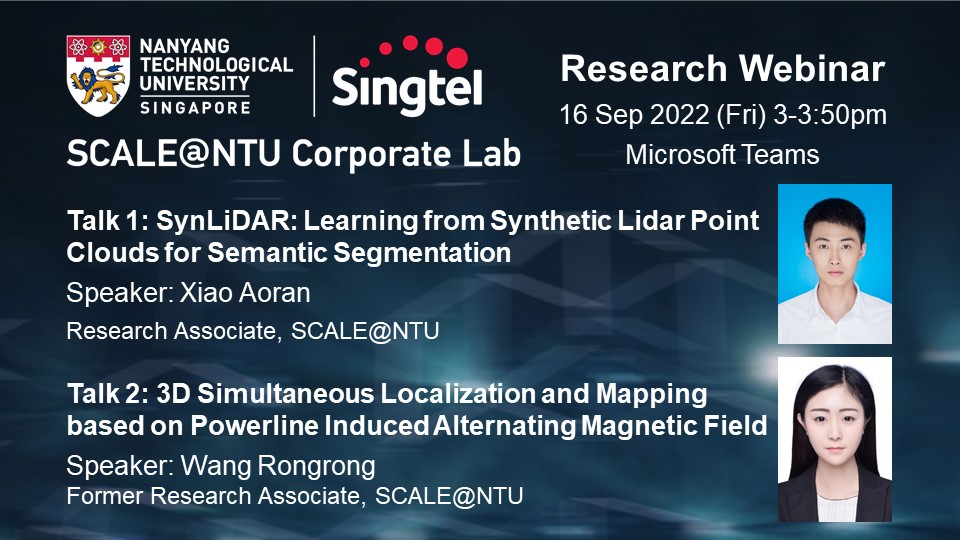SCALE@NTU Research Webinar Sep 2022

This research webinar on Teams is organized by Singtel Cognitive and Artificial Intelligence Lab for Enterprises (SCALE@NTU) to share the research work in the Corp Lab. For registration, please visit:
https://wis.ntu.edu.sg/pls/webexe88/REGISTER_NTU.REGISTER?EVENT_ID=OA22090615190658
Talk 1: SynLiDAR: Learning from Synthetic Lidar Point Clouds for Semantic Segmentation
Knowledge transfer from synthetic to real data has been widely studied to mitigate data annotation constraints in various computer vision tasks such as semantic segmentation. However, the study focused on 2D images and its counterpart in 3D point clouds segmentation lags far behind due to the lack of large-scale synthetic datasets and effective transfer methods. We address this issue by collecting SynLiDAR, a large-scale synthetic LiDAR dataset that contains point-wise annotated point clouds with accurate geometric shapes and comprehensive semantic classes. SynLiDAR was collected from multiple virtual environments with rich scenes and layouts which consist of over 19 billion points of 32 semantic classes. Extensive experiments show that SynLiDAR provides a high-quality data source for studying 3D transfer learning.
Speaker: Xiao Aoran, Research Associate, SCALE@NTU
Aoran Xiao received his B.Sc. and M.Sc. degrees from Wuhan University, China in 2016 and 2019, respectively. He is currently pursuing a Ph.D. degree with the School of Computer Science and Engineering at Nanyang Technological University. He is also working as a Research Associate in Singtel Cognitive and Artificial Intelligence Lab @NTU (SCALE@NTU). His research interests lie in point cloud processing, computer vision, and remote sensing.
Talk 2: 3D Simultaneous Localization and Mapping based on Powerline Induced Alternating Magnetic Field
Indoor location sensing is a basic function needed by various ubiquitous computing applications. From the past two decades, identifying new sensing modalities leveraging the existing residential instruments has been an interest of research. Given the properties of temporal stability and spatial distinctness, the alternating magnetic field (AMF) from the powerline network is a promising signal for location sensing. This work studies this powerline-induced AMF for simultaneous localization and mapping (SLAM) and indoor localization. While existing studies have adopted resonate antennas to sense AMF for an initial attempt of SLAM, their uniaxial sensor design falls short of exhibiting the vector field nature of AMF. To address this issue, we present a triaxial sensor setup to capture the powerline AMF signal filling the entire three-dimensional (3D) indoor space and formulate a new feature for SLAM. Compared with the uniaxial setup, our proposed triaxial setup can improve the localization accuracy to decimeter level.
Speaker: Wang Rongrong, Former Research Associate, SCALE@NTU
Rongrong Wang received her Master degree from the School of Electrical and Electronic Engineering in Nanyang Technological University, Singapore in 2018. She is currently a Ph.D. student with the School of Computer Science and Engineering, Nanyang Technological University, Singapore. She worked as a Research Associate in Singtel Cognitive and Artificial Intelligence Lab for Enterprises (SCALE@NTU). Her research interests include Sensing Networks, Cyber Physical System, and Internet of Things.
